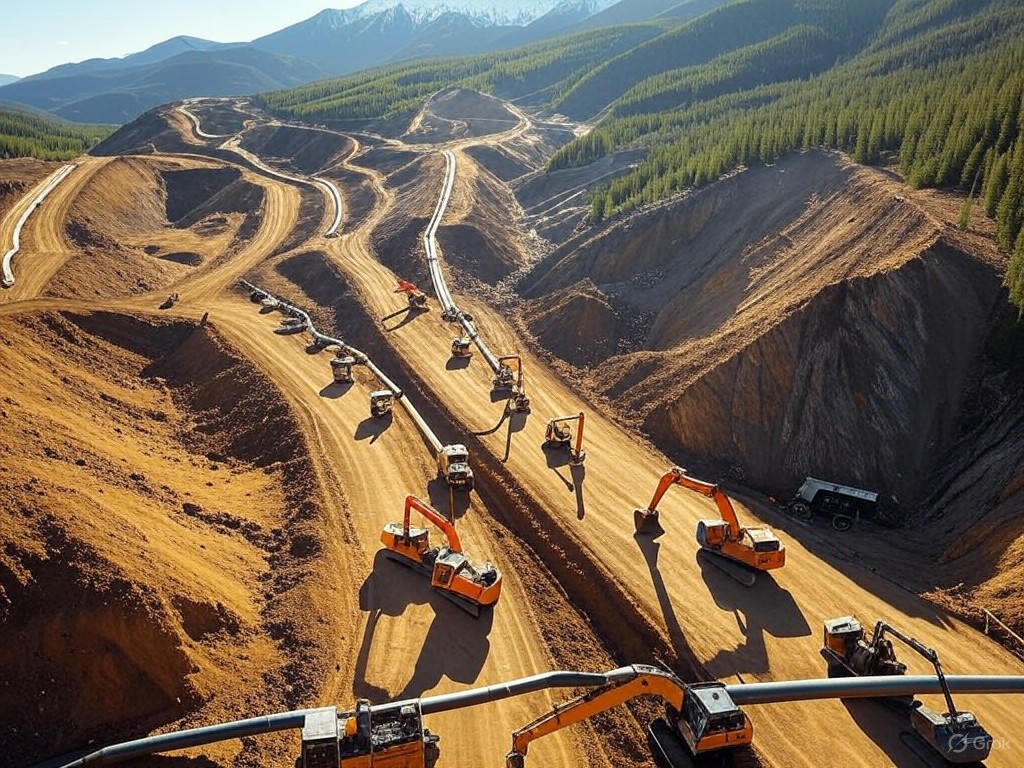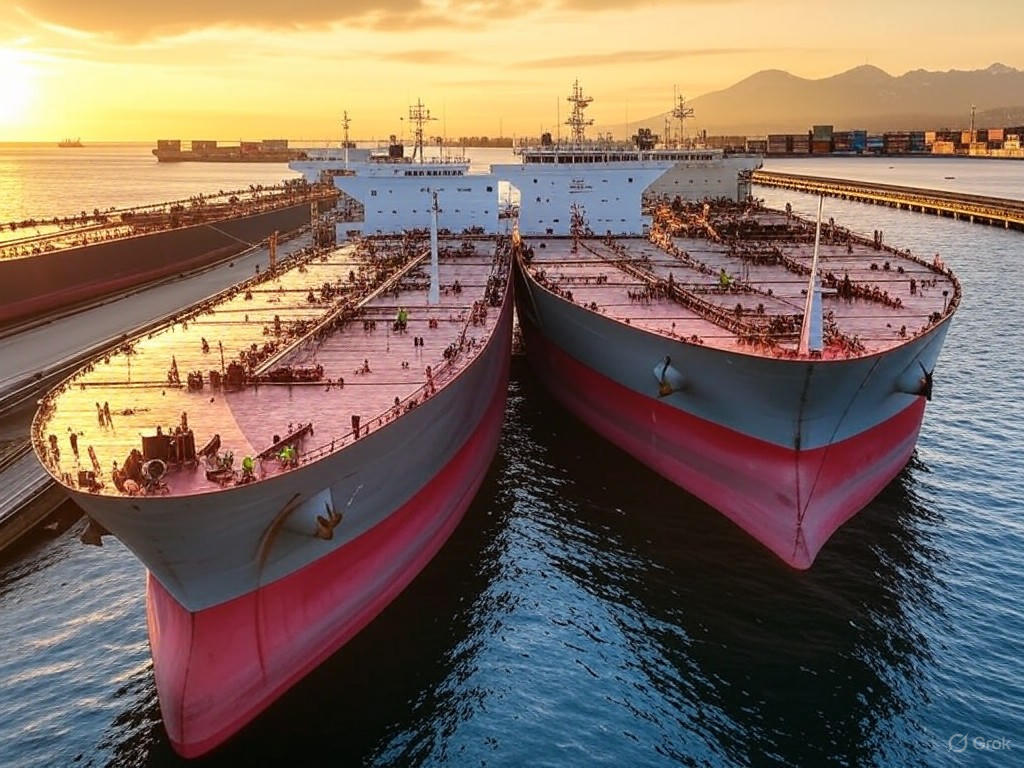Trans Mountain Pipeline: BC’s Role in Global Oil Markets
In the vast landscapes of British Columbia, where rugged mountains meet the Pacific Ocean, the Trans Mountain pipeline stands as a testament to human ingenuity and the enduring quest for economic stability. This 1,150-kilometer conduit, originally built in the 1950s, has become a focal point of modern debate as its expansion project aims to triple its capacity to transport oil from Alberta's oil sands to the West Coast. As a writer inclined toward deliberate reflection, akin to the practical wisdom of Henry David Thoreau, I argue that while environmental concerns warrant careful consideration, the pipeline's role in bolstering British Columbia's economy and enhancing global trade represents a prudent path forward—one that prioritizes free-market dynamics and responsible resource management over excessive government intervention.
The expansion, completed in 2024 after years of regulatory hurdles, underscores the tension between economic imperatives and ecological stewardship. Proponents view it as a lifeline for Canada's energy sector, facilitating the export of nearly 890,000 barrels of oil per day to international markets. Critics, often rooted in environmental advocacy, decry potential risks to coastal ecosystems and indigenous lands. Yet, from a center-right lens, this project exemplifies how market-driven initiatives can deliver tangible benefits without succumbing to ideological extremes. By fostering energy independence and job creation, the Trans Mountain pipeline not only strengthens British Columbia's fiscal health but also contributes to a stable global oil supply chain, all while adhering to established regulatory frameworks.
Economic Engine for British Columbia
The Trans Mountain pipeline is more than just a series of steel pipes; it is a vital artery pumping economic vitality into British Columbia. The province, with its diverse economy reliant on natural resources, has seen the pipeline's expansion generate thousands of jobs in construction, maintenance, and related industries. According to estimates from the Canadian government, the project has directly employed over 7,000 workers during its peak phases, providing high-wage opportunities in regions where traditional sectors like forestry and fishing have faced declines Canadian Association of Petroleum Producers. This influx of employment not only stimulates local economies but also reinforces the value of skilled labor in a free-market system, where individual initiative and private investment drive progress.
Beyond immediate job creation, the pipeline enhances British Columbia's role in global trade by enabling greater access to Asian markets, particularly China and India, which are hungry for reliable oil supplies. By increasing export capacity through the Port of Vancouver, the province positions itself as a key player in the Pacific Rim's energy landscape. This development could add billions to Canada's GDP, with projections suggesting an annual boost of up to $7 billion in export revenues Wall Street Journal on Canadian Oil Exports. Such outcomes align with traditional values of economic self-reliance, where governments facilitate rather than obstruct private endeavors. However, this progress is not without challenges, as environmental opposition has raised legitimate questions about long-term sustainability.

This image captures the expansive construction site of the Trans Mountain Pipeline winding through British Columbia's Rocky Mountains, symbolizing the blend of industrial ambition and natural grandeur that defines the region's economic landscape.
Navigating Global Oil Markets and Environmental Realities
As global oil markets grapple with volatility—from geopolitical tensions in the Middle East to the transition toward renewable energy—the Trans Mountain pipeline offers a stabilizing force. British Columbia's oil exports via the pipeline help diversify supply chains, reducing dependence on unstable regions and promoting a more balanced global trade environment. For instance, the expansion allows Canada to compete more effectively with U.S. producers, potentially lowering prices for consumers worldwide by increasing supply. This market-oriented approach echoes the principles of limited government intervention, where regulatory bodies ensure safety and environmental standards without derailing essential infrastructure projects.
Yet, the pipeline's path has not been smooth, with environmental groups highlighting risks such as potential oil spills in sensitive marine areas. Data from independent analyses indicate that while the risk of accidents is low—estimated at less than 1% per year based on historical pipeline operations—the consequences could be severe for British Columbia's coastal ecosystems International Energy Agency Oil Market Report. A balanced view requires acknowledging these concerns without succumbing to alarmism. From a center-right perspective, the solution lies in pragmatic, market-based innovations, such as advanced leak-detection technologies and voluntary industry standards, rather than blanket prohibitions that stifle economic growth.
The debate also touches on broader implications for global trade. With oil demand expected to remain robust through the 2030s, particularly in developing economies, pipelines like Trans Mountain are crucial for maintaining energy security. Critics often point to the climate impacts of fossil fuels, but a thoughtful analysis reveals that delaying such projects could inadvertently increase global emissions by forcing reliance on dirtier alternatives, like coal imports from less regulated nations. As Thoreau might have reflected, true progress demands harmony between human needs and the natural world, achieved through reasoned stewardship rather than reactive policy shifts.
Evidence and the Path Forward
Empirical evidence underscores the pipeline's net benefits. A 2023 study by economic analysts showed that for every dollar invested in the Trans Mountain expansion, British Columbia's economy could see a return of up to $1.50 in long-term gains, driven by increased trade and infrastructure development Globe and Mail Economic Analysis. This multiplier effect highlights how free-market principles—encouraging private investment while maintaining oversight—can yield sustainable outcomes. Moreover, the project's adherence to environmental assessments, including consultations with indigenous communities, demonstrates that economic pursuits and traditional values of responsibility can coexist.
Opposition, while vocal, often overlooks these successes. Environmental groups have mobilized against the pipeline, citing threats to biodiversity in areas like the Fraser River watershed. However, data from monitoring programs indicate that modern pipelines, equipped with state-of-the-art safety measures, have a lower incident rate than other transportation methods, such as rail or tanker ships Pipeline and Hazardous Materials Safety Administration Report. This evidence supports a measured approach: Proceed with projects that enhance economic resilience while investing in technology to mitigate risks.

This photograph depicts oil tankers docked at the Port of Vancouver, with the Trans Mountain Pipeline terminus visible, illustrating the pipeline's critical link to global oil trade and British Columbia's export capabilities.
A Deliberate Conclusion
In conclusion, the Trans Mountain pipeline embodies the essence of practical problem-solving in an interconnected world. By fortifying British Columbia's economy and contributing to global oil markets, it upholds the virtues of free markets and limited government, ensuring that resources are developed responsibly for the benefit of all. Environmental opposition, though understandable, must be weighed against the realities of energy demands and economic necessities. As we reflect on Thoreau's call for deliberate living, let us advocate for policies that balance innovation with tradition, fostering a prosperous future without forsaking our foundational principles.
Ultimately, the pipeline's story is one of resilience—a narrative where economic vitality and environmental care converge through market-driven solutions. Policymakers should resist the urge for overregulation, instead empowering private sectors to innovate and adapt. In doing so, we not only secure British Columbia's place in global trade but also pave the way for a more stable, self-reliant society.

